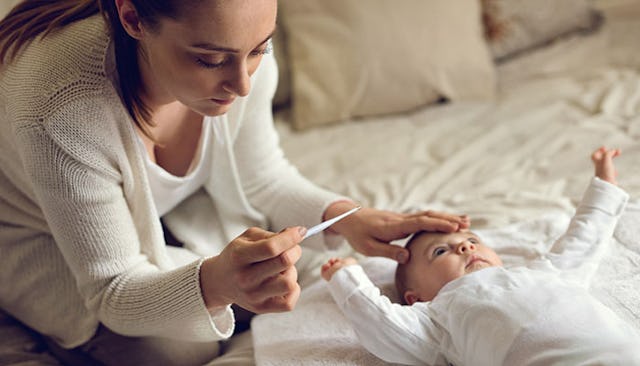You're Not The Only One, Fevers Freak All Parents Out

Whether you have a brand-new baby or an elementary-school child, fevers will freak you out. It’s not something that ever gets easier, FYI. So don’t feel bad if you find yourself feeling like a brand-new parent every time your child gets sick. It happens to the best of us.
Fever is bound to happen, so the best way to deal with it is to be prepared before it happens.
Have a well-stocked medicine cabinet
Always have a fever reducer on hand. You do not want to be rushing to find a 24-hour drugstore. It’s best to have a few options too. While liquid oral acetaminophen is what you typically may think of, if your child is tight-lipped, vomiting, or has a habit of spitting out liquid medication, it’s good to have a suppository like FeverAll® on hand. Pediatricians recommend having both options in case of fever.
Dosing errors among parents are quite common
According to a new study* in the September journal Pediatrics, 84% of parents measured the wrong dose of liquid medication based on their children’s recommended dose. Sixty-eight percent of those mistakes involved measuring out too much medicine — probably due to the different measuring tools parents need to use and poorly designed labels and packaging. FeverAll® Acetaminophen Suppositories is the only branded acetaminophen product for children with dosage instructions for infants as young as 6 months of age — and you don’t have to worry about measuring out too much or too little.
Realize there are easy ways to get children to take medicine, but they may not be oral
FeverAll® suppositories saved my sanity when my child was an infant. Do you have any idea how hard it is to get a fussy infant to swallow a dose of medicine, and how easy it is to administer the wrong dose? FeverAll® suppositories give parents total control, and you don’t have to worry about whether your child swallowed the right dose. It’s available in three strengths for children from 6 months to 12 years of age and is a safe, reliable alternative to the liquid form of acetaminophen.
If you’re unsure about whether you should be concerned, ask your doctor
According to the American Academy of Pediatrics, fever in babies begins at 100.4 degrees Fahrenheit. But a 100.4-degree fever in an infant is not the same as a 100.4-degree fever in a 6-year-old. Always be sure to ask your doc about when you should be concerned. Never be afraid to call your doctor or pediatric nurse practitioner — it’s what they’re there for.
Don’t take advice from friends when it comes to fevers
You may have one friend who insists fevers are perfectly healthy and don’t need to be treated. You may have another who knows a great trick for trading off doses of acetaminophen to get a fever down. Advice from friends and family is great, but when it comes to medical advice, only take it from your doctor. Your doctor knows your baby’s history and is the only one who can truly dispense safe and accurate medical advice without old wives’ tales.
Try not to panic
Yes, fevers are scary — but they don’t have to be. Prepare yourself beforehand and take a deep breath. Just because your child feels warm, doesn’t necessarily mean they have a fever. It’s easy to overdress babies, even in colder weather. That alone can make a baby hot and fussy. Always take their temperature before giving them fever-reducing medicine. The thermometer that gives the most accurate reading for your baby, and is recommended by pediatricians, is a digital rectal thermometer.
Have popsicles and plenty of juice on hand
Hydration is key when it comes to fevers. Make sure your child is drinking. If your child is old enough, a popsicle makes it easier for fussy ones. (How many kids do you know who refuse popsicles?)
Take a deep breath, parents. The fever — and the stress — will pass. It’s all about having the right tools to help you cope.
*Yin HS, Parker RM, Sanders LM, et al. “Liquid Medication Errors and Dosing Tools: A Randomized Controlled Experiment.” Pediatrics, 2016; 138 (4): e20160357.
Follow FeverAll on Facebook and Instagram.
Take a look at this video as Mommy MD Guides team member and pediatric nurse practitioner Megan Jolin explains the advantages of using an acetaminophen suppository like FeverAll® for baby’s fever.
This article was originally published on